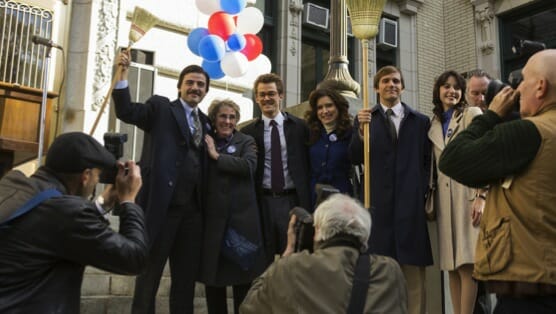Show Me a Hero: “Part 3” and “Part 4”
(Episode 1.03 and 1.04)

One of the things Show Me a Hero couldn’t help but remind me of was Michael Schur’s Parks & Recreation. It also deals with local politics, but in a much more optimistic, forgiving, and satirical manner than what we see in David Simon’s version of America. Both shows are populated by sprawling casts and feature scenes of mob anger, and Simon and Schur are the two writers on television most interested in exploring process—the way an accumulation of small events grows into something bigger. In fact, there’s a certain odd parallel between Ben Wyatt’s career as mayor of Partridge, Minnesota where he soon lost his position due to a city planning fiasco (Ice Town) and that of Nick Wasicsko, who during these two episodes, loses his position due to Yonkers’ intolerance. But Parks and Recreation had one thing that Show Me a Hero doesn’t, and that’s airtime, which continues to have a negative effect on the show’s storytelling.
As Hero continues, it becomes more clear that structurally it just doesn’t have the right balance of material for filling six episodes. Early into “Part 4” we’re introduced to another story of life in Yonkers’ housing projects, however (like the others in the first two episodes) this is a very rote tale of poverty and misery: a young woman becomes pregnant and her boyfriend is arrested. At this point, every public housing story has been a tale of very typical misery. Immigration, pregnancy, drugs—it’s like Simon and William Zorzi, the show’s other writer, had a checklist they were running through for every non-white character on the show, the clichéd beats that needed to be hit in order to depict exactly what form of poverty these characters are subjected to.
These stories are one of the most important parts of Hero, in theory. It’s to Simon’s credit that he didn’t want to make the show about the legislation alone, it’s about the people affected by the legislation. Yet by making the stories so utterly basic, it’s almost as bad as not showing them at all. As Hero continues, the cast remains extraordinary, putting out moving performances from stiff dialogue and routine stories that are always just one step away from insulting, but that’s not enough. In order to really show us the lives of those affected by Yonkers’ institutionalized racism, we have to have fully three-dimensional people to care about, and that remains sadly missing. Were Hero to have more time, it feels like these stories could have become something more real and not just miserabilist stereotypes. But with six episodes and four stories it wants to tell here, there just isn’t much time to get through to real depth. As a result, the show still doesn’t come together, and we’re left wondering whether it will at all, with just two more episodes left.
-

-

-

-

-

-

-

-

-

-

-

-

-

-

-

-

-

-

-

-

-

-

-

-

-

-

-

-

-

-

-

-

-

-

-

-

-

-

-

-








































